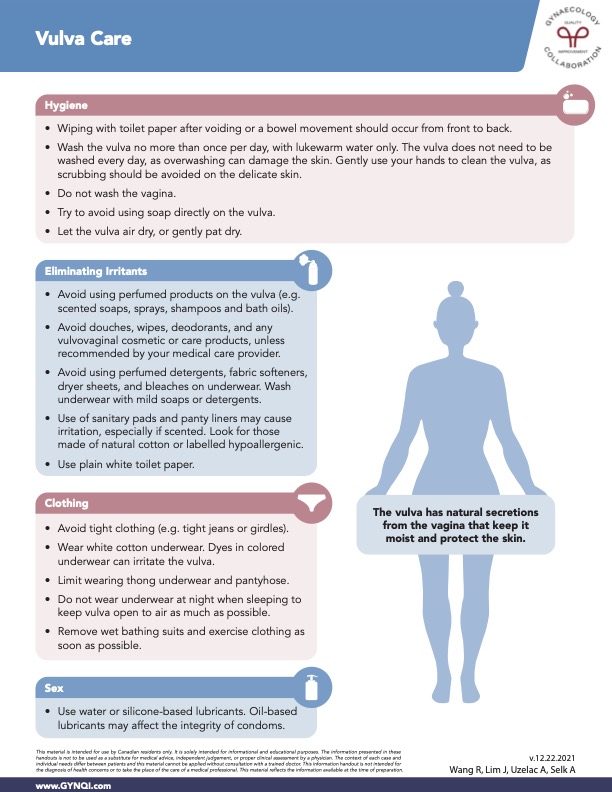
Table of Contents
- Summary
- Vulvar Hygiene
- Eliminating Irritants from Your Hygiene Routine
- Clothing and Your Vulva
- Helpful Tips to Keep Your Vulvar Health in Check
Summary:
- The vulva requires minimal care—typically just a gentle rinse with lukewarm water once a day. Overwashing can damage the sensitive skin, and using soap directly on the vulva should be avoided.
- Common irritants such as scented soaps, perfumed hygiene products, and certain laundry detergents can cause discomfort. Opting for hypoallergenic or unscented products can help maintain vulvar health.
- Wearing breathable and loose-fitting clothing is essential for your vulvar health. Avoid tight underwear and consider going without underwear at night to reduce moisture buildup and promote air circulation.
- If you experience any unusual symptoms, such as strong odours or irritation, it’s important to consult a healthcare professional. Staying informed and proactive can greatly support your overall genitourinary health.
Vulvar hygiene is essential for maintaining comfort and health in your most intimate area. Contrary to common beliefs, the vulva actually doesn’t require daily washing–a gentle rinse with lukewarm water is mostly all you need. We’ll cover some important key points in staying on top of your genitourinary health, and highlight some common misconceptions when it comes to keeping your vulva clean and happy. By being mindful of hygiene products and clothing choices, you can effectively support your vulvar health.
Vulvar Hygiene
The vulva uses natural secretions from the vagina to keep itself moist and to help protect the delicate skin. When it comes to vulvar care, there are a few precautions you can take to keep on top of your health. Below are some handy tips and tricks for caring for your genital region.
- After a bowel movement, be sure to wipe from front to back with toilet paper. This helps prevent harmful bacteria from causing complications.
- The vulva does not need to be washed every day, as overwashing can damage the skin. Using lukewarm water, gently use your hands to clean the vulva no more than once per day.
- Try to avoid using soap directly on the vulva.
- Gently pat dry or let the vulva air dry.
Do not wash the vagina. This process, also known as douching, involves washing the inside of your vagina with water or branded douching products. Douching can lead to vaginal infection, and in worst-case scenarios, can even affect your ability to get pregnant.
If you notice any strong odour or irritation, contact your doctor right away.
Eliminating Irritants from Your Hygiene Routine
Irritants play a part in vulva discomfort and can lurk in unexpected places. Cleaning and self-care products are often not made with intimate areas in mind and it’s a good habit to take stock of your everyday products to see if they could potentially cause vulva irritation.
Scented products: Scented soaps, sprays, shampoos, and bath oils are prime suspects when it comes to vulva irritation. Avoid using scented or perfumed products in your hygiene routine.
Personal hygiene products: Unless recommended by your doctor, avoid douches, wipes, deodorants, and any vulvovaginal cosmetic or care products.
Laundry products: Perfumed detergents, fabric softener, dryer sheets, and bleach should be avoided on laundry day. Stick to only washing underwear using mild soaps or detergents.
Menstruation products: Sanitary pads and panty liners can irritate the vulva. Look for hypoallergenic sanitary products or those made with natural cotton.
Bathroom products: Believe it or not, items like toilet paper can even cause vulvar sensitivities. Switch to using plain white toilet paper to help stave off irritation.
Certain products can do more harm than good. Making simple swaps to more vulva-friendly options can go a long way in maintaining your vulvar health.
Clothing and Your Vulva
Taking a look through your wardrobe, it’s important to note how certain items can negatively affect your vulva’s health. Any styles in your rotation that restrict breathability should be worn only on occasion.
- Avoid tight clothing. Stick to roomier styles to help keep your vulva happy.
- Dyes in your underwear can irritate your vulva. Stick to wearing white cotton underwear for breathability and easing sensitivities.
- Try to limit wearing thong underwear and pantyhose.
- When sleeping, avoid wearing underwear to keep your vulva open to air as much as possible.
- After a workout or swim, be sure to remove any wet clothing right away.
Wearing breathable clothing or going without a cloth barrier allows your vulva to breathe, which keeps moisture from building up or creating an environment for bacteria to build–we also advocate for going commando at night.
Helpful Tips to Keep Your Vulvar Health in Check
Prioritizing vulvar hygiene is key to maintaining the overall health of your genitourinary system. By being mindful of the hygiene products you use and making thoughtful clothing choices, you can greatly enhance your vulvar health. A gentle rinse with lukewarm water is usually sufficient, and staying informed about the best hygiene practices can dispel common misconceptions about vulvar care. Taking these steps will support your genitourinary health and keep your vulva clean and happy.


